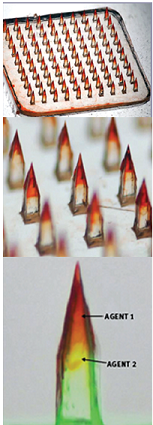 Gavin Jenkins, in his recent article for PittMed, reports on the work of McGowan Institute for Regenerative Medicine affiliated faculty member Louis Falo, Jr., MD, PhD, Professor and Chairman of the Department of Dermatology at the University of Pittsburgh School of Medicine. Seven years ago, and inspired by the history of scratch vaccinations, Dr. Falo began researching microneedle array technology, which delivers medicine through the skin. Afterall, our skin is our biggest organ, and our first line of defense against viruses and other pathogens we come across.
Gavin Jenkins, in his recent article for PittMed, reports on the work of McGowan Institute for Regenerative Medicine affiliated faculty member Louis Falo, Jr., MD, PhD, Professor and Chairman of the Department of Dermatology at the University of Pittsburgh School of Medicine. Seven years ago, and inspired by the history of scratch vaccinations, Dr. Falo began researching microneedle array technology, which delivers medicine through the skin. Afterall, our skin is our biggest organ, and our first line of defense against viruses and other pathogens we come across.
“The control of the body’s entire immune response can probably be achieved by manipulating the skin,” Dr. Falo says. “I have always tried to manipulate immunity by manipulating skin immunity.”
And now his work has led to what is probably the world’s first study examining the effectiveness of microneedles on skin cancer.
A phase I clinical trial is testing proper dosages for patients with cutaneous T-cell lymphoma. It’s still early in the process, but if microneedle therapy pans out, it could change how skin cancer is treated. No more operations. No chemotherapy injections. Just a Band-Aid covering a fingertip-size patch with tiny medication-infused needles.
Microneedles, Dr. Falo says, are better than intradermal injections, which introduce a drug to the dermis (the thick layer of “living tissue” under the epidermis, the outer skin layer). Intradermal injections are hard to reproduce. Microneedles, on the other hand, deliver the same results each time, and they inject medicine directly to both the dermis and epidermis.
The immune system is more efficient in the skin than in other tissues. Dr. Falo has found that immunizations delivered directly to the skin result in stronger and longer-lasting immunizations than those delivered below the skin or into muscle.
When doctors administer chemotherapies through an IV or injection, they destroy rapidly dividing cells faster than other cells. But then the toxins flow throughout the body, producing the side effects of hair loss, nausea, and fatigue.
Dr. Falo believes microneedles can deliver a lower dose of chemotherapy medication straight to squamous cell carcinomas, basal cell carcinomas, and cutaneous lymphomas. The drug’s high concentration to one area would cut down on, and possibly prevent, negative side effects.
“It enters cancer cells in the skin where it is delivered and essentially doesn’t go anywhere else,” Dr. Falo says.
Microneedles might not be there yet, but Dr. Falo says that the field is gaining momentum. And his team also is devoted to reversing autoimmunity with microneedles. In this context, microneedles are a tool for introducing changes to the microenvironment. Down the road, he envisions help for patients with psoriasis, eczema, and contact dermatitis (like poison ivy).
Illustration: Microneedle arrays are fingertip-size patches that deliver drugs right to the skin. The needles can contain multiple adjuvants that stimulate the skin’s immune response. Falo Lab.
